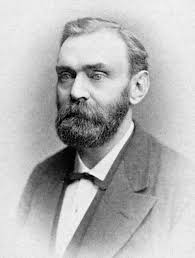The Life and Legacy of Alfred Nobel

Introduction
Alfred Nobel, a name synonymous with innovation and philanthropy, is best known for creating the Nobel Prizes, which recognise outstanding contributions in various fields, including medicine, literature, and peace. Born on October 21, 1833, in Stockholm, Sweden, his legacy profoundly impacts both scientific and cultural spheres, highlighting the importance of rewarding humanitarian achievements.
Early Life and Inventions
Nobel was the son of an inventor and engineer, which influenced his passion for science and technology. His most notable invention, dynamite, revolutionised construction and mining industries, making them safer and more efficient. However, his invention also had destructive applications, raising ethical questions about its use. This duality in Nobel’s legacy prompted him to reflect on how he would be remembered.
The Nobel Prizes
In his will, written in 1895, Nobel dedicated the majority of his fortune to establishing the Nobel Prizes upon his death in 1896. He specified that the prizes be awarded to those who, during the preceding year, shall have conferred the greatest benefit to mankind. This initiative was birthed from his desire to leave a positive legacy, countering the fear that his inventions could lead to more harm than good.
Significant Prizes and Impact
Since their inception in 1901, the Nobel Prizes have recognised numerous influential individuals and organisations. Laureates like Marie Curie, Martin Luther King Jr., and Malala Yousafzai have made historic strides in science, peace, and human rights, reflecting the diverse fields Nobel wished to honour. The prizes are not just awards; they inspire global efforts towards progress in knowledge, culture, and humanitarian ideals.
Contemporary Relevance
Today, as we face global challenges such as climate change, inequality, and public health crises, the principles underlying the Nobel Prize remain vital. They remind us of the importance of striving for excellence while fostering a better world. Furthermore, the ongoing discussion about how to balance innovation with ethical responsibility continues to resonate with Nobel’s own struggles with the impact of his inventions.
Conclusion
Alfred Nobel’s life serves as a testament to the complexities of innovation and morality. His establishment of the Nobel Prizes has not only shaped fields of science and art but also instilled a culture of recognising humanitarian efforts. As society evolves, the questions he raised about legacy and responsibility remain increasingly relevant, inspiring future generations to seek progress that benefits all of humanity.









